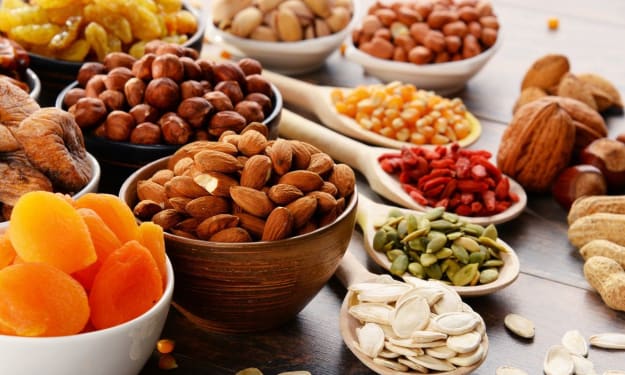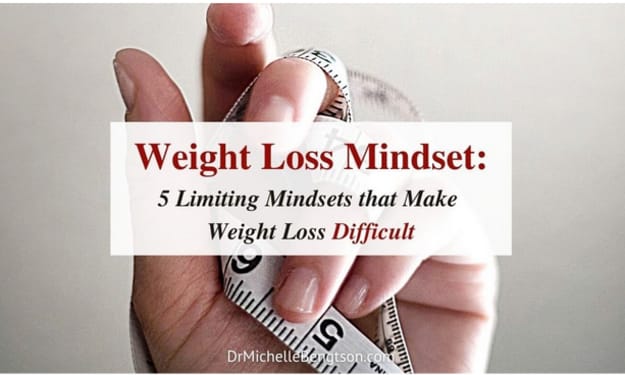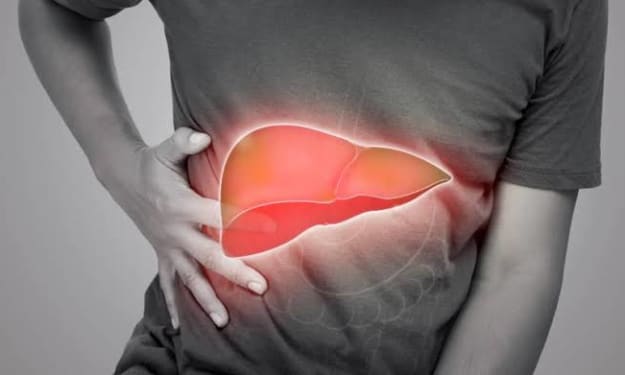diet
Tips, tricks, recipes, and hacks to make your diet a successful one.


The #1 Best Foods To Eat Every Day For Good Health And Longer Life
The majority of us aspire to live a long and healthy life. While certain elements are absolutely beyond our control, such as our genetics, other factors, such as our food choices, can also play a role in whether we live to see our 100th birthday.
Vijay MistryPublished 5 days ago in Longevity

5 "Bad" Carbs You Should Be Eating When You Have Diabetes, According to a Dietitian
Despite what you may have heard, not all carbohydrates need to be avoided when you have diabetes. In fact, some carbs that have been labeled as “bad” or off-limits may actually offer some benefits if you’re actively trying to manage your blood sugar.
Kaly JohnesPublished 5 days ago in Longevity

24 Gut-Healthy Dinners for Better Blood Sugar
Support a healthy gut when you make these flavorful dinners. These dishes are packed with prebiotic-rich ingredients like whole grains, beans, and potatoes to offer at least 7 grams of fiber per serving. Getting enough fiber can help you feel full for longer, support beneficial gut bacteria and stabilize blood sugar levels. And did we mention these meals are also lower in saturated fats and sodium—while keeping carbs and calories in mind—to align with a diabetes-appropriate eating pattern? Nutritious recipes like our Slow-Cooker Three-Bean Chili Mac are great when you have some extra time on your hands. Or, make our delicious Salmon-Stuffed Avocados on those days when you want dinner ready in just 15 minutes.
Kaly JohnesPublished 5 days ago in Longevity

Five Reasons Why Peanut Butter Is So Good For You
Disclosure: AI technology assisted in the flow and research for this article. The article was created by a human (me) and has improved greatly with Grammarly. This article intends to inform and help those who are crazy about peanut butter and would like even more reasons why they should keep eating it!


Weight Loss Mindset: 5 Limiting Mindsets that Make Weight Loss Difficult
Have you ever attempted to lose weight? I've been there before. Even just a few months ago. For the last 30 years, I've assisted patients who wanted to improve their health. I studied how a weight loss mentality influences people and how such mindsets make weight loss challenging as a technical expert at listening to people. The good news is that we will triumph!
Vijay MistryPublished 6 days ago in Longevity

Some unknown facts about nails
The Nails are clone like plates which are present on the tips of our fingers and toes. They help to protect the tips of the fingers and toes, but do you know what our nails are made up of and how do they grow long? Well, the nails are made up of keratin protein.
Parveen BalochPublished 9 days ago in Longevity

The unknown facts about liver
Liver is one of the most important and 2nd largest organ after skin you can say the largest internal organ of our body. The liver performs various function, but the major work performed by the liver is the filtration of the blood. Like water is filtered by kidney, liver also filters the blood, remove the waste harmful materials, and provide us the purified blood.
Parveen BalochPublished 9 days ago in Longevity

Is MSG bad for you?
What is MSG? In 1968, Dr. Robert Ho Man Kwok felt ill after dinner at a Chinese restaurant. He wrote a letter detailing his symptoms to a prestigious medical journal, pondering whether his illness had resulted from eating monosodium glutamate— also known as MSG. Kwok’s connection between his headache and this common seasoning in American Chinese cuisine was just a hunch. But his letter would dramatically change the world's relationship with MSG, inspiring international panic, biased science, and sensationalist journalism for the next 40 years.


Debunking Nutrition Myths: Let's Get Real About What You Eat!
Have you ever wondered if everything you've been told about nutrition is actually true? Are you confused by the endless stream of conflicting information about what foods are good for you and what foods are bad? In this article, we will dive into some common nutrition myths and uncover the truth behind what's really on your plate.
DR. Suryaveer kadiyanPublished 11 days ago in LongevityAmbiguous Loss & Body Image
Something that comes up in my work with clients often (and that I didn’t anticipate ever seeing as a dietitian) is the desire to improve body image while also feeling really frustrated that the body isn’t getting smaller via nutrition and self-care. More and more I’ve come to identify this as part of grief and loss work, and as I was pursuing my Graduate Certificate in Sexual Health a term that came up was “ambiguous loss”.
Emily the Period RDPublished 11 days ago in Longevity

Artificially-Sweetened Drinks May Increase Heart Disease Risk by 20%, New Study Shows
If you drink artificially-sweetened beverages regularly, recent research suggests it might be impacting your heart health. A new study, published March 5th, 2024, in Circulation: Arrhythmia and Electrophysiology, a journal of the American Heart Association, has found a potential link between consuming artificially-sweetened drinks and an increased risk of atrial fibrillation (AFib).1 AFib is a common condition characterized by an irregular heartbeat that can lead to serious complications such as stroke, heart failure and other heart-related issues.2 Specifically, the researchers observed a 20% increase in AFib risk for those who drank more than 2 liters of artificially-sweetened beverages each week. These findings are timely, considering an estimated 12.1 million Americans will have AFib by 2030.3 Read on to learn more about this compelling new study and what you can do to minimize your risk.
Kaly JohnesPublished 11 days ago in Longevity

9 Natural & Effective Ways to Lower Blood Pressure, According to Heart Experts
One of the many reasons I love being a dietitian is sharing with people how powerful food truly is. Certain foods can help manage health conditions such as diabetes, and others can help support the healthy functioning of internal systems such as our digestive tract. Even more so, food can also boost our energy levels, improve our mood and lower blood pressure, which is especially important for those managing hypertension.
Kaly JohnesPublished 11 days ago in Longevity
















